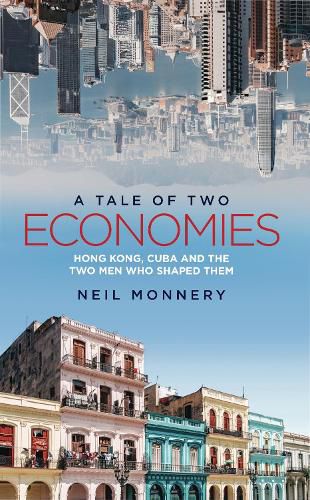Readings Newsletter
Become a Readings Member to make your shopping experience even easier.
Sign in or sign up for free!
You’re not far away from qualifying for FREE standard shipping within Australia
You’ve qualified for FREE standard shipping within Australia
The cart is loading…






This title is printed to order. This book may have been self-published. If so, we cannot guarantee the quality of the content. In the main most books will have gone through the editing process however some may not. We therefore suggest that you be aware of this before ordering this book. If in doubt check either the author or publisher’s details as we are unable to accept any returns unless they are faulty. Please contact us if you have any questions.
As the world entered the turbulent 1960s, two men, half a world apart, one a doctor and the other a classicist, both foreigners far from home, were charged with shaping the economic strategy of their adopted countries. They held a common objective. Both were determined to create a better world. And both were deeply thoughtful about how to discharge that heavy responsibility. More than half a century later, their principles still drive the economic policies of those countries today. But their proposed solutions could not have been more different. One, Che Guevara, is well known as a revolutionary. He was central to Fidel Castro coming to power in Cuba and is an icon of revolutionary politics. He is less well known as the key architect of Cuba’s communist economic system. And yet he spent many years establishing Cuban economic policy in roles such as Minister of Industry, President of the National Bank of Cuba, member of the economic National Directorate, member of the Council of Ministers and lead negotiator for Cuba with the communist bloc. He was as serious about economics and its effect on society as he was about revolutionary warfare. The other, John Cowperthwaite, is largely unknown today. And yet he was fundamental to Hong Kong’s economic recovery immediately after the Second World War. Then, as deputy finance minister in the 1950s, and as finance minister in the 1960s, he established Hong Kong’s unique laissez-faire economic policy. Cowperthwaite crafted a twenty-first-century economy using the policies of the classical economists of two centuries earlier. Over a critical twenty-year period, he argued passionately for his laissez-faire, free-market approach and fought off constant attempts to expand the role of the state. These two men are arguably the originators of the most significant natural economic experiment of the last century, pitting the free-market model of Hong Kong against the state interventionism in Cuba. Each suite of policies has been pursued faithfully for over half a century with remarkable results that have lessons for us all. Far from being a dry, technocratic story, the journeys taken show the rich, complex and human nature of economic policy development and execution. This book looks at the very different paths chosen by Hong Kong and Cuba, and the central role of Ernesto, ‘Che’ Guevara and Sir John James Cowperthwaite.
$9.00 standard shipping within Australia
FREE standard shipping within Australia for orders over $100.00
Express & International shipping calculated at checkout
This title is printed to order. This book may have been self-published. If so, we cannot guarantee the quality of the content. In the main most books will have gone through the editing process however some may not. We therefore suggest that you be aware of this before ordering this book. If in doubt check either the author or publisher’s details as we are unable to accept any returns unless they are faulty. Please contact us if you have any questions.
As the world entered the turbulent 1960s, two men, half a world apart, one a doctor and the other a classicist, both foreigners far from home, were charged with shaping the economic strategy of their adopted countries. They held a common objective. Both were determined to create a better world. And both were deeply thoughtful about how to discharge that heavy responsibility. More than half a century later, their principles still drive the economic policies of those countries today. But their proposed solutions could not have been more different. One, Che Guevara, is well known as a revolutionary. He was central to Fidel Castro coming to power in Cuba and is an icon of revolutionary politics. He is less well known as the key architect of Cuba’s communist economic system. And yet he spent many years establishing Cuban economic policy in roles such as Minister of Industry, President of the National Bank of Cuba, member of the economic National Directorate, member of the Council of Ministers and lead negotiator for Cuba with the communist bloc. He was as serious about economics and its effect on society as he was about revolutionary warfare. The other, John Cowperthwaite, is largely unknown today. And yet he was fundamental to Hong Kong’s economic recovery immediately after the Second World War. Then, as deputy finance minister in the 1950s, and as finance minister in the 1960s, he established Hong Kong’s unique laissez-faire economic policy. Cowperthwaite crafted a twenty-first-century economy using the policies of the classical economists of two centuries earlier. Over a critical twenty-year period, he argued passionately for his laissez-faire, free-market approach and fought off constant attempts to expand the role of the state. These two men are arguably the originators of the most significant natural economic experiment of the last century, pitting the free-market model of Hong Kong against the state interventionism in Cuba. Each suite of policies has been pursued faithfully for over half a century with remarkable results that have lessons for us all. Far from being a dry, technocratic story, the journeys taken show the rich, complex and human nature of economic policy development and execution. This book looks at the very different paths chosen by Hong Kong and Cuba, and the central role of Ernesto, ‘Che’ Guevara and Sir John James Cowperthwaite.